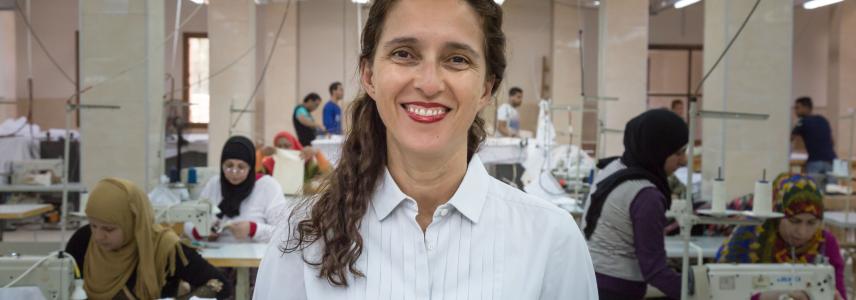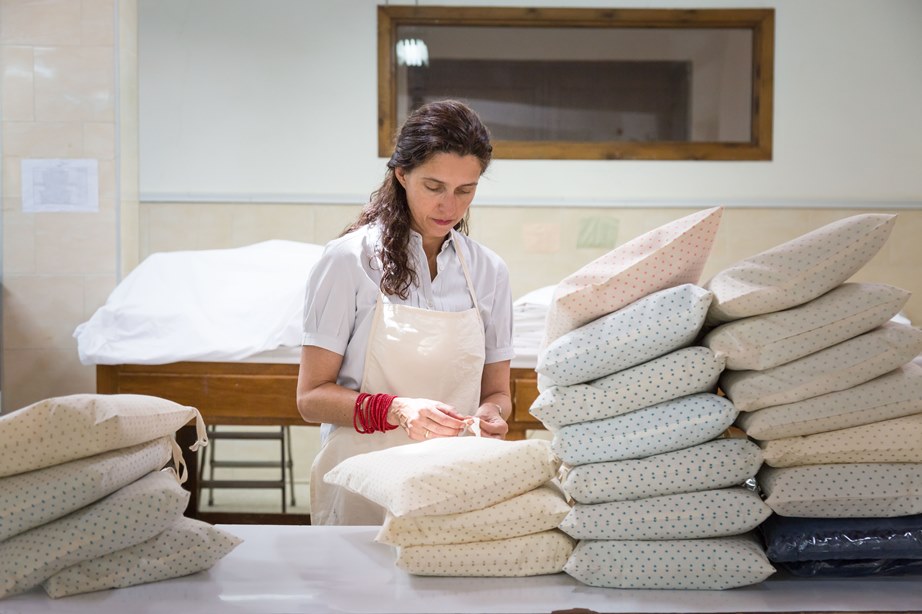Linen exports open doors for Egypt’s underprivileged women

For many women in Egypt, leaving home and finding paid work is impossible. Local handicraft business Malaika Linens has stepped in to help these women, giving them a chance to learn a valuable skill and improve their economic standing. By participating in CBI’s Home Decoration and Textiles Egypt export programme, the company has fine-tuned its logistics and gained important exposure on the European market. Now a flourishing business, its impact on women continues to grow.
Founded in 2004 by Margarita Andrade and Goya Gallagher, Malaika Linens uses Egyptian cotton – renowned for its very long staple, which, when woven, produces a fine, smooth fabric – to produce top quality bed linens previously not available in the local market. Its collections combine delicate hand embroidery with simple, contemporary designs and include a luxury line based on ancient hand-drawn thread crafting techniques.
Daughters, sisters, wives
The firm’s business model is quite as special as the materials it uses: the core production process is hand embroidery, which the team teaches to underprivileged women in order to help them become financially independent. Most of the 90 odd staff members, needless to say, are female. The company is based in the housing development Haram City, about 30 km outside of Cairo. Easy to reach for women who cannot easily travel from home, the location also offers pleasant working conditions, as there less pollution here than in the city.
Explains Business Development Manager Laila Helaly, ‘We believe the crafts industry offers women great opportunities, because of Egypt’s heritage in this sector. I myself have been fortunate enough to work with people who respect and accept me as a female manager, but gender equality is clearly a problem in Egypt. Some men just don’t allow their daughters, sisters or wives to work. It leaves them entirely dependent on the men, even if those men are abusive.’
Growing exports to Europe
Until recently Malaika Linens’ sales were mostly in Egypt; only 15% of its products were exported. That began to change when the company joined CBI’s export programme Home Decoration and Textiles Egypt. Explains Laila, ‘The training sessions we’ve had have helped us tremendously, especially in terms of organisation and logistics. One of our internal obstacles was the order cycle communication: it was not well organized and before joining the CBI programme it caused us to lose a lot of clients. CBI’s order forms and contact forms have really helped us improve our documentation and communication. Learning how to communicate and fulfil orders for the European market – mainly by getting exposure at trade fairs like Maison et Objet – has also been very important. Being there helped us to see how the European market operates.’
After setting a regional export expansion plan into action, Malaika Linens now exports consistently to several countries in Europe. The firm has launched a new export line for hotel linens and has signed a contract with a big hotel developer as its sole linen supplier.
Helping refugees, protecting the planet
Malaika Linens does not keep its success to itself. As the company grows, so does its social impact. In the next two or three years, the firm aims to build new training centres in areas in which women badly need job opportunities. The expansion will not just benefit Egyptian women either, says Laila. “In collaboration with the United Nations’ refugee agency, UNHCR, we’re also reaching out to refugee women – a group of women new to us.’
The company sees these expressions of Corporate Social Responsibility (CSR) as a key part of its mission. Says Laila, ‘CSR is all about the private sector helping local communities on a micro level, while the government focuses on the macro level.’
For Malaika Linens, this responsibility extends not just to women and girls, but also to the planet. The firm is currently moving away from plastic packaging and uses natural dyes for its linens. Next up on the agenda: Fair Trade certification.
Improving the lives and livelihoods
As they look to the future, the Malaika Linens team hope to keep sharing Egyptian crafts with the world. ‘Our ambition is to encourage people to buy genuine, hand-made Egyptian products made with Egyptian raw materials. Not only will this help preserve traditional Egyptian handicrafts, it will also help us improve the lives and livelihoods of Egyptian women.’

Explore designs and find out more about this company on the Malaika Linens website and its Facebook and Instagram accounts.